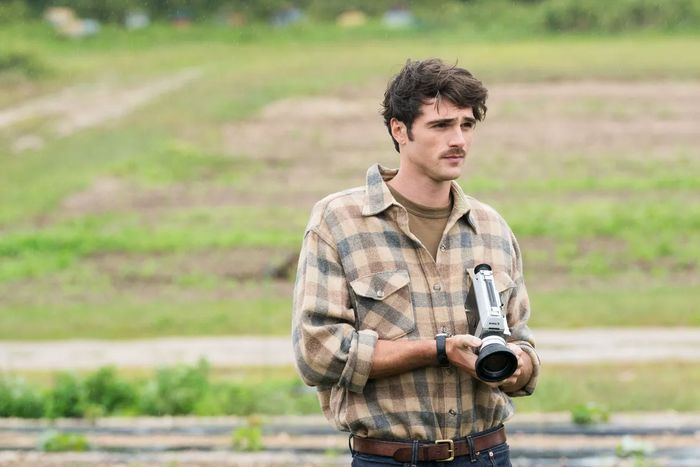
This review was originally published on May 18, 2024 out of the Cannes Film Festival. We are recirculating it now timed to Oh, Canada’s theatrical release.
If Paul Schrader’s most recent films have made a meme out of the image of a solitary man sitting in an empty room and writing in a journal, then his latest flips that idea on its head. Some have surely found it strange that the septuagenarian Schrader’s austere cinema — in particular the so-called “Man in a Room” trilogy of First Reformed (2017), The Card Counter (2021), and Master Gardener (2022) — has found such purchase among younger viewers. But think of his haunted heroes as aspirational figures, as individuals who find ways to reconcile their innermost thoughts with their actions, and suddenly, it makes sense. These films connect with an audience that came of age in the era of both constant isolation and constant communal surveillance.
Now, with Oh, Canada, adapted fairly faithfully from Russell Banks’s novel Foregone, Schrader presents a portrait of a dying man who feels that his inner self has failed to live up to his public one. “When you have no future, all you have is the past,” ruminates Richard Gere’s Leonard Fife, a legendary documentary filmmaker giving his final interview to a pair of his former students. “And if your past is a lie, then you cease to exist.” This is not a solitary individual in a spare, lonely room: Fife is on camera, surrounded by lights and microphones, and although he is clearly unwell, he’s agreed to the interview because he believes it will give him a chance finally to be honest. He also asks that his wife Emma (Uma Thurman) also be present, because then it will feel like a true confessional.
Fife, we learn, has gained renown in Canada for his politically committed films, after fleeing the United States in his 20s to avoid the draft. The movie hops between the dying documentarian’s thoughts and episodes from his past, in a hall-of-mirrors style reminiscent of Bernardo Bertolucci’s The Conformist, a key influence on Schrader’s work. Flashbacks intrude on the present, memories open onto other memories. Jacob Elordi plays the young Fife, though as the periods blend with each other, Gere himself sometimes shows up in his character’s flashbacks. Thurman herself appears again as another woman from his early years, not unlike the great Dominique Sanda’s multiple, symbolic roles in The Conformist. The once Adonis-like Gere, so gorgeous and opaque in Schrader’s American Gigolo, released 44 years ago, here makes for an engagingly pissy guide through Fife’s current physical challenges and his lifetime of passive regret. The tall, thin Elordi, almost concave with indecision, perfectly embodies the character’s weak-willed forward progress through life.
Although his interviewers want to hear about his career, Fife prefers to talk about his personal life — about the wife and baby son he left behind in Virginia, and about other emotional pit-stops along the way. He’s built a career as a man of principle, as an ideological warrior, and he can’t forget about the ruins of his past. He also keeps hinting at further, even more upsetting secrets — secrets that he insists Emma doesn’t know about – and the film preserves these mysteries until near the end. When the anticipated revelations come, they may feel oddly anticlimactic. Because the movie ultimately isn’t about any one person’s specific betrayal or dishonesty, but about the fact that all our lives are haunted by shame and failure, by truths we kept from others out of convenience and cowardice.
It’s easy to see why Schrader might have been drawn to this material. Beyond the intimations of mortality that come naturally with aging, the director had a health scare a couple of years ago, which he discussed openly at the time. Banks himself, a friend of Schrader’s (and the author of the novel upon which he based one of his most-loved films, 1997’s Affliction), passed away in early 2023. All of which presumably fed into the idea of making a film about a dying filmmaker’s testimonial. But while Oh, Canada is narratively bleak, it’s stylistically quite light on its feet, almost airy. The constant cutting among timelines gives the 91 minute picture a pleasant momentum, while songs by the country-folk singer Matthew Houck (a.k.a. Phosphorescent) add a lyrical quality to Fife’s wanderings. (The effect is reminiscent of the Michael Been songs the director used generously in 1992’s oddball crime drama Light Sleeper, perhaps his greatest film.) Oh, Canada might be a movie that was conceived in the long dark night of the soul, but it moves towards brightness and possibility. Whether that brightness actually represents Canada or what we call “the undiscovered country” is up for debate. Either way, it’s as if a great weight has been lifted from both its subject’s and its maker’s shoulders.
More From the 2024 Cannes Film Festival
- There’s Horror Lurking Under Becoming a Guinea Fowl’s Absurdist Humor
- A Night Out With the Strippers of Sean Baker’s Anora
- It’s No Wonder That Everyone Falls for Anora


